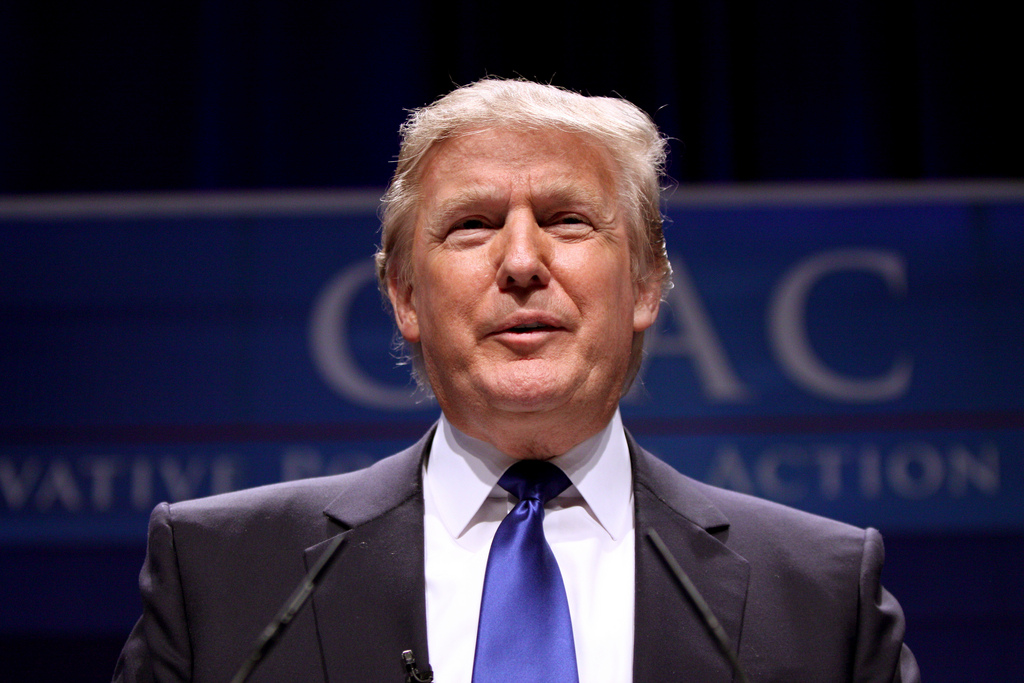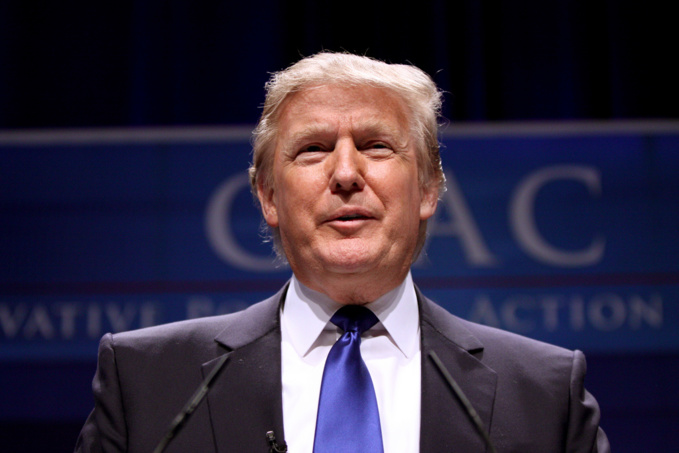US President Donald Trump returned to Europe after a short break (last week he took part in the G20 summit in Hamburg). Communicating with world leaders, including French President Emmanuelle Macron, as well as his first meeting with Russian President Vladimir Putin, did not help Donald Trump remove the growing pressure on him in Washington.
In this situation, Donald Trump found an unexpected ally in the person of French President Emmanuel Macron, who invited him to visit Paris.
the US leaving the Paris climate agreement, as well as disparaging remarks about France, which American President allowed himself during last year's election campaign, did not prevent Emmanuel Macron from taking the first step toward meeting Donald Trump.
The White House reacted to the invitation with great enthusiasm. "Few of our allies are closer than France," a senior US administration official told. According to him, "President was happy to accept the invitation."
A representative of the French government Christophe Castaner explained President Macron’s reasons to invite Donald Trump to celebrate the National Day of France (Bastille Day, July 14). According to him, the main reason was the fact that the US president came to Paris in connection with another historic date - the 100th anniversary of America's entry into the First World War on the side of France. Mr. Castaner added: "This has a strong political meaning. Emmanuel Macron does not want the US president to be isolated. Trump sometimes makes decisions with which we disagree, such as the climate change. But we either say: we are not communicating anymore, because you are unpleasant to us, or to continue contacts so that he remains in our circle. "
In addition to Trump’s attempts to bury the Paris climate change agreement, the French have had at least one more reason to feel ambivalent about Donald Trump. Last year, at the height of the presidential campaign in the United States, a loud scandal broke out after Mr. Trump said that "France is no longer France". This and some other of his statements caused a storm of indignation in Paris. In response, then French Prime Minister Manuel Valls called Donald Trump a bad man, and President François Hollande accused him of "disrespect for the ally."
Nevertheless, a survey of the sociological institute Elabe, published on the eve of the visit, showed that 59% of the French approve of the invitation of the US president. For their part, organizers of Donald Trump's visit to Paris thought of every trifle to convince the American guest and his wife Melania that "France is still France" and is still America's closest ally, as it was 100 years ago.
In the opinion of experts in Paris and Washington, Donald Trump and Emmanuel Macron are antipodes in their temperament, outlook and political genesis. Nevertheless, after the first visit of Donald Trump to Paris, Macron seems to become his key European partner. There is nothing surprising in this paradox. Among the continent’s key leaders, President of France today is the only one who can afford an esoteric friendly relationship with the unpopular head of the White House, without fearing for his rating inside the country.
German Chancellor Angela Merkel is in the run-up to the parliamentary elections in September. She is trying to distance herself from Donald Trump, who defies European values and left the Paris agreement on climate.
British Prime Minister Teresa May is in a similar situation. Her positions within the country have already extremely weakened. It would be dangerous to subject them to testing by Donald Trump - the announced visit to London by the US president eventually had to be postponed for the next year.
As for Emmanuel Macron, his recent impressive victories in the presidential and parliamentary elections (in May and June this year) have given him some kind of leeway, both domestically and internationally. Voters will forgive a popular and ambitious head of state, even if he is exchanging courtesies with Donald Trump.
According to French media quoting sources surrounded by President Macron, he would prefer not to focus on contentious topics in negotiations with the American guest, rather paying attention to issues on which the positions of the two countries are the closest.
First of all, it is the fight against terrorism. France is a key ally of the United States in the Middle East. In terms of the number of combat sorties, the French Air Force is on the second place in the anti-terrorist coalition created by the United States, second only to the Americans themselves.
In addition, France alone is bearing the whole front of the fight against terrorism. This is the south of the Sahara, covering a dozen countries and a huge territory that is comparable in size to half the area of the United States. The task of Paris is to get Washington to participate in financing of a regional grouping G5 Sahel, created under the auspices of Paris, consisting of military contingents of five countries (Chad, Niger, Burkina Faso, Mali, Mauritania) and fighting radical Islamist movements. So far, the US has distanced itself from this mission, considering the region of West Africa a zone of exclusive responsibility of France - the former metropolis, which has a network of military bases there.
source: reuters.com
In this situation, Donald Trump found an unexpected ally in the person of French President Emmanuel Macron, who invited him to visit Paris.
the US leaving the Paris climate agreement, as well as disparaging remarks about France, which American President allowed himself during last year's election campaign, did not prevent Emmanuel Macron from taking the first step toward meeting Donald Trump.
The White House reacted to the invitation with great enthusiasm. "Few of our allies are closer than France," a senior US administration official told. According to him, "President was happy to accept the invitation."
A representative of the French government Christophe Castaner explained President Macron’s reasons to invite Donald Trump to celebrate the National Day of France (Bastille Day, July 14). According to him, the main reason was the fact that the US president came to Paris in connection with another historic date - the 100th anniversary of America's entry into the First World War on the side of France. Mr. Castaner added: "This has a strong political meaning. Emmanuel Macron does not want the US president to be isolated. Trump sometimes makes decisions with which we disagree, such as the climate change. But we either say: we are not communicating anymore, because you are unpleasant to us, or to continue contacts so that he remains in our circle. "
In addition to Trump’s attempts to bury the Paris climate change agreement, the French have had at least one more reason to feel ambivalent about Donald Trump. Last year, at the height of the presidential campaign in the United States, a loud scandal broke out after Mr. Trump said that "France is no longer France". This and some other of his statements caused a storm of indignation in Paris. In response, then French Prime Minister Manuel Valls called Donald Trump a bad man, and President François Hollande accused him of "disrespect for the ally."
Nevertheless, a survey of the sociological institute Elabe, published on the eve of the visit, showed that 59% of the French approve of the invitation of the US president. For their part, organizers of Donald Trump's visit to Paris thought of every trifle to convince the American guest and his wife Melania that "France is still France" and is still America's closest ally, as it was 100 years ago.
In the opinion of experts in Paris and Washington, Donald Trump and Emmanuel Macron are antipodes in their temperament, outlook and political genesis. Nevertheless, after the first visit of Donald Trump to Paris, Macron seems to become his key European partner. There is nothing surprising in this paradox. Among the continent’s key leaders, President of France today is the only one who can afford an esoteric friendly relationship with the unpopular head of the White House, without fearing for his rating inside the country.
German Chancellor Angela Merkel is in the run-up to the parliamentary elections in September. She is trying to distance herself from Donald Trump, who defies European values and left the Paris agreement on climate.
British Prime Minister Teresa May is in a similar situation. Her positions within the country have already extremely weakened. It would be dangerous to subject them to testing by Donald Trump - the announced visit to London by the US president eventually had to be postponed for the next year.
As for Emmanuel Macron, his recent impressive victories in the presidential and parliamentary elections (in May and June this year) have given him some kind of leeway, both domestically and internationally. Voters will forgive a popular and ambitious head of state, even if he is exchanging courtesies with Donald Trump.
According to French media quoting sources surrounded by President Macron, he would prefer not to focus on contentious topics in negotiations with the American guest, rather paying attention to issues on which the positions of the two countries are the closest.
First of all, it is the fight against terrorism. France is a key ally of the United States in the Middle East. In terms of the number of combat sorties, the French Air Force is on the second place in the anti-terrorist coalition created by the United States, second only to the Americans themselves.
In addition, France alone is bearing the whole front of the fight against terrorism. This is the south of the Sahara, covering a dozen countries and a huge territory that is comparable in size to half the area of the United States. The task of Paris is to get Washington to participate in financing of a regional grouping G5 Sahel, created under the auspices of Paris, consisting of military contingents of five countries (Chad, Niger, Burkina Faso, Mali, Mauritania) and fighting radical Islamist movements. So far, the US has distanced itself from this mission, considering the region of West Africa a zone of exclusive responsibility of France - the former metropolis, which has a network of military bases there.
source: reuters.com



















